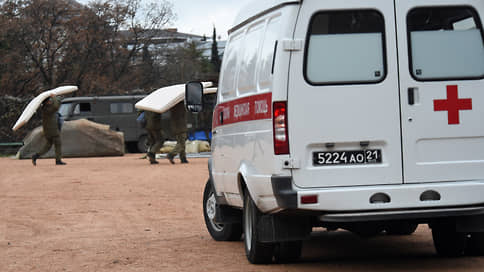Patients ask to leave them doctors – Newspaper Kommersant No. 185 (7386) dated 10/06/2022
[ad_1]

The Zdravstvuy Patients’ Association has asked the Russian government to defer oncology service specialists from mobilization, as the healthcare system is experiencing a “colossal shortage of personnel” in this area. Earlier, State Duma deputy Oleg Leonov asked not to mobilize specialists in the production of prostheses, of which there are only about 100 people in Russia. The All-Russian Union of Patients (VSP) warns that the pandemic has already “exposed” the cutting edge of healthcare: during this time, for various reasons, 100 thousand doctors left the profession. It should be noted that earlier Russian President Vladimir Putin said about the inadmissibility of non-core use in the mobilization of doctors and other highly qualified specialists.
Irina Borovova, the head of the Zdravstvuy association, a member of the Human Rights Council under the President of the Russian Federation, decided to contact the Cabinet of Ministers when she learned that a young medical physicist had been mobilized in one of the regions – “an exclusive specialist who cannot be found in the daytime with fire.” “Without morphologists, cytologists, geneticists, it is impossible to make a diagnosis and figure out what treatment is indicated. Without radiologists, medical physicists, oncosurgeons, chemotherapists, it is impossible to get treatment,” Ms. Borovova explained. She cites as an example two oncosurgeons who, from the first year of medical school, have “corporal” written on their military ID. “The man already has a scientific degree, he is a highly qualified surgeon. Calling him a corporal is at least ineffective,” continues Ms. Borovova. “For many years we have been monitoring the situation with personnel and we see that the oncological service has a colossal shortage of personnel. Not only are there simply not enough of them, but very old specialists also work. If there is an outflow now, in our opinion, this will catastrophically worsen the provision of oncological care to our patients.”
Earlier, State Duma deputy Oleg Leonov urged not to mobilize specialists in the manufacture of prostheses. According to him, two prosthetists are already being called up – in Moscow and Kabardino-Balkaria. “There are a little more than a hundred specialists per country, the specialty is on the list of professions that are not subject to conscription. All of them are engaged in prosthetics for our fighters who returned from combat operations with disabilities. The call of one prosthetist turns into the fact that there will simply be no one in the region to deal with prosthetics, ”Mr. Leonov wrote in his Telegram.
“Where there is a shortage of personnel, primarily in the countryside, in principle, there is no need to take medical workers,” says Andriy Konoval, co-chairman of the Deystviye medical workers’ trade union. As an example of how this can affect patients, he cites the situation in one of the central hospitals in the Sverdlovsk region. According to the agenda, a young operating surgeon was taken there, and a 70-year-old specialized specialist remained in the entire hospital, who “clearly, cannot perform any operation.”
“It is difficult to overestimate the shortage of qualified personnel in healthcare,” agrees Yan Vlasov, co-chairman of the All-Russian Union of Patients. He recalls that quite recently, narrow specialists were already involved in Russia to solve a common problem: “During the pandemic, narrowly qualified doctors, for whose training the state spent a lot of money, for example, hand surgeons, oncologists, were sent to work in the covid zone, up to those who worked as assistants to infectious disease specialists. As a result, we still got an increase in mortality, but not from covid, but from cardiovascular diseases, oncology and other chronic diseases.” According to Mr. Vlasov, now primary health care is “practically bare”: “For various reasons, more than 100,000 doctors left medicine during the pandemic. There was a shortage of personnel in hospitals. About 60% of doctors are now forced to work for one and a half rates, and more than 30% work for two rates due to a shortage of personnel. The VSP believes that specialties that are really needed locally, mainly in the field of surgery, may be subject to partial mobilization. And they offer to provide a reservation to doctors who are ready to go to work for at least five years in rural areas.
In 2019, Deputy Prime Minister Tatyana Golikova reported to Vladimir Putin about a shortage of 25,000 doctors and 130,000 nurses. According to her, this situation has developed due to low wages and a low base salary.
Andrei Konoval notes that the Deystviye trade union is also preparing an appeal to the government. It will reflect another “important problem”: the mobilization of female doctors who have minor children. “All doctors have military registration specialties, and theoretically women can also be called up. It is clear that this is the third category, and we do not yet know of cases where a woman with children would be taken away, but since there are no clear regulatory rules or at least letters from the Ministry of Defense and the Ministry of Health, there is still high nervousness,” explains Mr. Konoval.
Assistant Minister of Health of the Russian Federation Alexei Kuznetsov told Kommersant that partial mobilization does not affect the availability and quality of medical care. “All types of assistance, including high-tech, are and will be provided as usual,” said Mr. Kuznetsov. “Medical workers, in accordance with the law, can be called up as part of partial mobilization. At the same time, we see that there are many doctors, paramedics, and nurses among the volunteers who come to the military registration and enlistment offices on their own, expressing their readiness to help people.”
It should be noted that earlier Russian President Vladimir Putin said about the inadmissibility of non-core use in the mobilization of doctors and other highly qualified specialists.
[ad_2]
Source link








